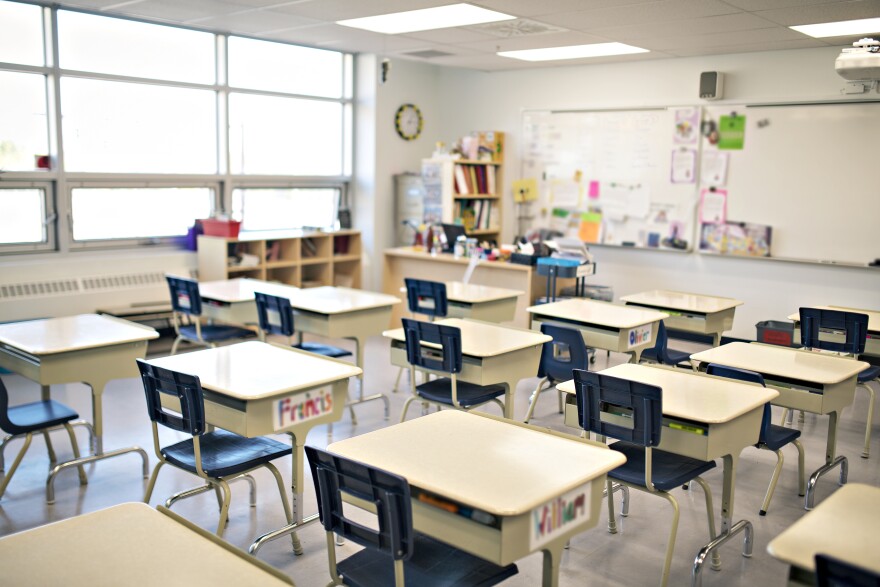Since stay-at-home orders were issued by Gov. Jim Justice on March 24, domestic violence calls are up in West Virginia. But advocates have seen fewer referrals for child abuse cases, and they think that will change once social distancing ends.
Call Volume Increases At Some W.Va. Domestic Violence Centers
Across West Virginia, there are several groups that help people in domestic violence situations find support, whether that’s for supplies or shelter. But the coronavirus pandemic has upended some of the traditional ways of doing that work.
“We have realized very quickly that staying at home is not always safe for everyone,” said Katie Spriggs, executive director of the Eastern Panhandle Empowerment Center in Martinsburg.
The center is one of 14 licensed domestic violence programs in West Virginia that serve all 55 counties. These programs fall within the West Virginia Coalition Against Domestic Violence and offer shelter, a 24-hour emergency hotline, advocacy, support and exit strategies for individuals and families in abusive situations.
Spriggs said since the stay-at-home order was issued by Gov. Justice, calls for shelter through the Empowerment Center have gone up significantly. And at least half of those calls are a single parent with a child.
“During a normal time, we get anywhere from one to three calls each day for shelter,” she said. “I mean, our hotline probably rings 100 times [on a] normal day, but actually requesting shelter, like ready to go exit plan, about one to three. And now we’re seeing about six to eight in a day.”
All of West Virginia’s shelters are still open, but Spriggs said her team has been inundated with calls.
Joyce Yedlosky, one of two team coordinators of the West Virginia Coalition Against Domestic Violence, said while the Coalition hadn’t heard whether all 14 programs have experienced an uptick in calls, some of them have.
Spriggs said all the licensed domestic violence programs have taken extra precautions to keep people safe, not only from abuse at home but also from COVID-19.
“We started by moving the beds, and then we started incorporating extra cleaning into the schedule, obviously extra sanitizing. And then we issued our own mini stay-at-home order within the shelters,” she explained. “So [that] none of the clients were coming and going anymore unless they had a medical need or they were going to work.”
In the Eastern Panhandle, the Empowerment Center’s shelter normally offers 16 beds, but due to social distancing, it’s now 10. So, they have partnered with 12 hotels throughout Berkeley, Jefferson and Morgan Counties to help provide shelter. During normal times, the Empowerment Center would typically only have one hotel partner per county.
So far, Spriggs said she’s not aware of any positive COVID-19 cases among those who they’ve placed in shelter.
What About The Kids Who May Be Experiencing Domestic Violence?
Kate Flack, CEO of the West Virginia Child Advocacy Network, or WVCAN, said her team is actually seeing a decrease in the number of child abuse reports coming in. But not because there is less child abuse happening right now, but because there are fewer eyes on kids.
“As soon as we have children back in closer connection and more frequent connection with their community-based allies, and trusted adults, we do expect there’s going to be a spike in reports,” Flack said.
WVCAN has a network of 21 advocacy centers serving 43 counties in the state. Centers support and coordinate the work of police, caseworkers, doctors, victim advocates, prosecutors and other professionals. And they’re still open during the pandemic.
Last year, more than 4,500 West Virginia kids went to one of these centers due to allegations of physical or sexual abuse, exploitation or other types of endangerment.
“Most children in West Virginia are very safe in their own homes, however those who are at risk of being abused, there’s a good chance that their abusers are at home with them,” she said.
Flack said the child advocacy centers have started offering tele-mental health, while still providing in-person forensic interviews for kids who may have been abused.
But, for Flack, it’s still a struggle to find some supplies.
“We’ve been trying to find materials for our centers, and they’ve been scrambling to find materials, even cleaning supplies,” she explained. “All of them were making sure that the kids are six feet apart from the interviewer, and most of them were making available masks.”
Fewer Eyes On Kids
Flack said 1 in 5 reports of child abuse nationwide come from school serivce personnel.
But this week Gov. Justice announced schools in West Virginia will remain closed for the rest of the academic year. Which begs the question, who will watch out for vulnerable kids stuck at home?
Berkeley County Superintendent of Schools Patrick Murphy said it’s about keeping that teacher-student support going through constant communication, whether through a phone call, or in a Zoom classroom, or just checking in on a child who visits a food drop off.
And if all else fails, he said his staff are prepared to stop by a home and check in on a child they may not have heard from.
“Families that may not have technology or the ability to connect with some of the things that we are providing, so, there may be nothing wrong; we can’t jump to that conclusion,” he said.
Murphy said doing home visits while still keeping physically distant, allows school staff members to see the students and connect that way, to make sure everything is okay — and to remind kids they aren’t alone.
Molly Born contributed to this story.





















